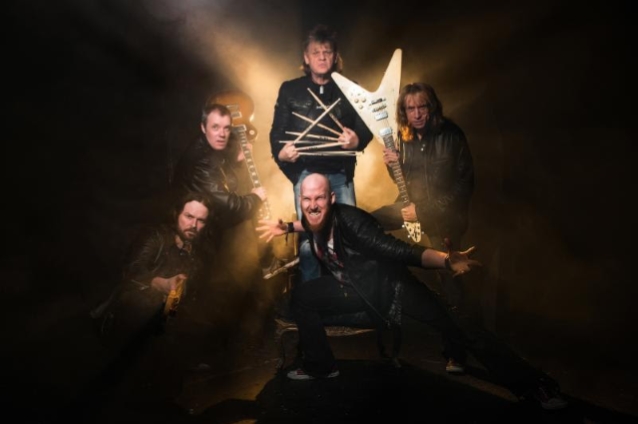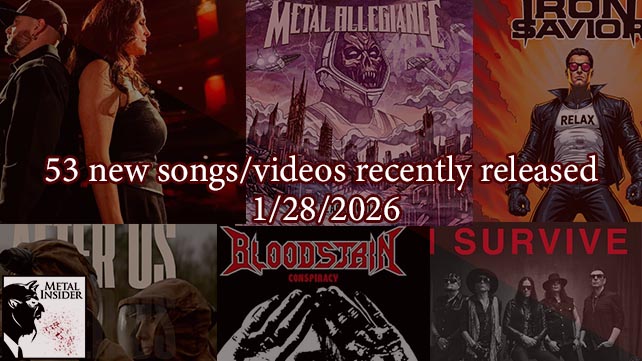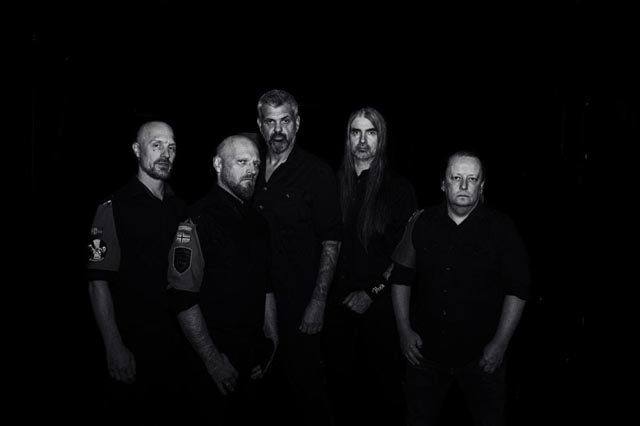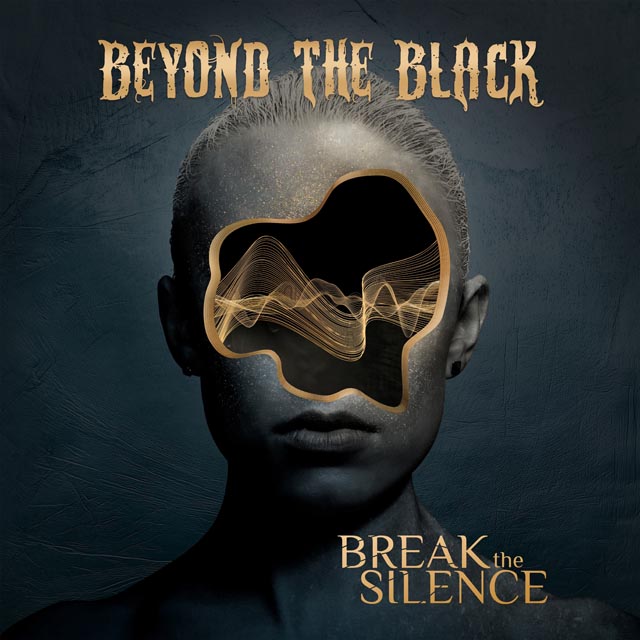
Arguably, Diamond Head could be considered the #3 most influential band to come out of the New Wave of British Heavy Metal movement, following closely behind Iron Maiden and Motorhead. Diamond Head is also – and this is unquestionable, essential to the birth of thrash, as evidenced by the not-so-secret heapings of praise and notes of influence by guys like Lars Ulrich and Dave Mustaine.
At the helm of Diamond Head since the band’s 1976 inception has been guitarist/songwriter Brian Tatler, a rocker to the fullest extent, throwing shade with his trademark white Flying V and headbanging along to his now-classic rifffage from Diamond Head classics like “Helpless” and “Am I Evil.” His band’s 1980 debut, Lightning to the Nations, is a certified classic of the NWOBHM – not bad for an album that originally had only 1000 copies pressed. Tatler’s weathered the music storms throughout the years with the band, which was originally active until around 1985, then up for reformations in 1990, and again in 2000 which has continued to present day, uninterrupted. He’s soldiered through a series of lineup changes – one of the latest, and one of the best, actually, is vocalist Rasmus Bom Anderson, who came aboard in 2014. Anderson makes his recorded Diamond Head debut on the band’s self-titled album released earlier this year (the band’s first new recorded music in almost a decade), and is comparable to original screamer Sean Harris on steroids – he brings a dynamic shot of life to the vocal spot.
Brian Tatler, on the eve of an extensive new Diamond Head U.S. tour in support of the new album, took some time out to chat with Metal Insider about life in one of metal’s most revered classic bands, covering topics like the NWOBHM itself, that famous Metallica connection, and the ups and downs of the band’s career. Here’s what he had to say.
I first want to say what a great addition Rasmus was with this latest album. He really does the Sean Harris era justice while adding a new sense of energy to the music. Was that important to you to find someone who could really channel the classic Diamond Head material while sounding very contemporary?
Thank you. I didn’t think about finding a new singer who was contemporary but it’s a good observation. My main concern back in 2014 was to find a good singer who lives in the UK and could do justice to the Diamond Head back catalog. Writing new material was not even on the agenda. It’s only once we stated touring with Rasmus that we began talking about writing songs together to see if we could. I didn’t fully realize how great Ras is and just how creative he is until I heard the guide vocals in the studio as we were recording the new album in July of 2015.
This album is very much classic Diamond Head, yet you are able to move into directions with songs like “All The Reasons You Live,” which doesn’t heavily rely on your riffs like other Diamond Head songs – this one sounds like it could be played on rock radio right now as a new band. Tell me about how you approached songwriting for this album, and what really sparks a good song for you.
Thank you for your kind words. “All The Reasons You Live” is the only song on the album in dropped tuning – C# G# C# F# A# D#, which may be one of the reasons it sounds a bit more modern. It’s a simple groove in the verses and it works well because Ras’s vocal melody is so great. I co-wrote the music for that song in 2008 with my old friend Dave Nicholls, who is Slipknot’s live FOH engineer. I gave it to Ras in 2014 and he was able to weave his magic on top of what I already had. As a band we made a few arrangement changes in rehearsal. All my songs start with a riff – I make tapes of riffs and then select all the best ones when it’s time to make a new record. Sometimes I have had a riff for ten or more years but never managed to do anything with it until now. It’s great to have too many songs for an album so I can pick the best ones. It pays to keep everything – it might come in one day.
Before this album, it had been a number of years since the last Diamond Head studio album. How do you know when it’s time to release something new?
When we started writing the songs for the new album after a few weeks it became obvious that there was something happening and we should take the new material to its logical conclusion which would be to release a new album. It’s a statement of where Diamond Head is now in 2016. It had become almost impossible to write with our singer Nick living in Brisbane and drummer Karl living in the U.S. It took Ras joining in 2014 for it all to come together.
I was always curious about your thoughts on the Death and Progress record, since it was essentially the “comeback” record for the band in the early 90’s. Looking back, with the whole National Bowl thing (a particularly rough 1993 British gig opening for Metallica) and all of that, do you feel the record was rushed at the time? There were a lot of great tracks on there like “Run,” so did you feel like the record didn’t get the attention it deserved?
Death & Progress took the longest and is most expensive album Diamond Head ever made. Sean and I began writing songs for it in 1990 and the album was eventually released in June 1993. We demoed around 25 songs and played three UK tours where we had a chance to road test a lot of the material. We probably spent at least two and a half to three months in expensive studios like The Music Station, Park Gate, Great Linford Manor and Nomis. It’s a good album but the band split soon after its release and so we did not promote it like we should have.
What did you think of the whole New Wave of British Heavy Metal movement? Obviously, it was a huge influence on so many bands, but do you think it kept a lot of bands locked into a particular time period? Some bands like Motorhead were able to rise above it, but to me, bands like Tygers of Pan Tang really became swallowed up by it and are known mainly for their work in that period of time.
I thought the NWOBHM was great, it was a youth movement right on the back of Punk Rock (which I liked) I was very excited by the idea that Diamond Head could get a record deal because of all the sudden press attention bands like Def Leppard, Iron Maiden, Samson and Angel Witch were getting. To outlive the genre, what you had to do was keep going and keep producing consistently good albums like Iron Maiden & Saxon, but unfortunately most of the bands of the time, including Diamond Head, had fucked up by 1985/86 and disappeared. I don’t think the NWOBHM did Iron Maiden any harm.
The metal world was devastated with the passing of Lemmy – what were your impressions of him as a person and as a musician? Did you know him well, or recall having any of those famously great conversations with him?
I liked Motorhead in the early days but did not really follow them. I bought singles like “No Class” and “Overkill.” They were very fast for the time and an influence along with Judas Priest on some of our faster songs like “Helpless” and “The Prince.” “Ace of Spades” is always great to hear, it’s very exciting. I only met Lemmy once in at a club in London, I said hello and shook his hand but he was playing a pinball machine, obviously, and seemed kind of distracted. I saw them with Lars Ulrich at Port Vale football ground. Lars and I went there while he was stopping at my house in the summer of 1981. I saw them again in 2011 when Diamond Head were on the same bill at Heavy M.T.L and Heavy T.O. Canada.
How did you first become aware of Metallica, and what did you think the first time you heard one of their Diamond Head covers?
Lars wrote me a letter around January 1982 and explained that his band was called Metallica and they were rehearsing six hours a day six hours a week! I was impressed by this as Diamond Head had never rehearsed that hard. Next Lars sent a tape to Sean Harris at our fan club address and it had a cover of “It’s Electric” on it, I think. Then, in 1984, he sent me the “Creeping Death” 12” single with “Am I Evil?” On the B-side, this was on an indie label called Music For Nations, so although I was really flattered I still had no idea how huge and important a band they were to become. They eventually recorded FOUR Diamond Head songs which is incredible. I have seen Metallica 22 times and they always put on a great show.
How do you look back upon the years where you were with RPK Studio and Radio Moscow? You seem to always achieve great sounding material when you produce, and those albums with Radio Moscow were very slick-sounding. What that a fulfilling era for you?
It was a lot of fun, I had a lot of free time and I had the keys to the studio, we would lock ourselves in and have drug parties. The most fun I ever had was at RPK. Radio Moscow was my band that I formed after Diamond Head stopped functioning in 1985. Sean was seeking a solo record deal and I decided to take over the running of RPK studio which was bought and paid for by Diamond Heads old manager Reg Fellows. I recorded local bands and made a lot of demos for Radio Moscow. I only made one album and one EP with Radio Moscow before being offered the chance of a publishing deal and the potential of making a new Diamond Head album with Sean in 1990.
Metal has been through so many transformations and rebirths over the years, and we hear about so many sub-genres of metal where it really gets confusing. How do you feel about heavy music being so fractured, in a way, for example – some people don’t think they can enjoy heavy music if they feel it’s too commercial or doesn’t have that “street credibility?”
I don’t know, to me its personal taste, I like certain bands and a lot of the dark, detuned, grunting vocal type bands don’t do it for me now. I grew up listening to the classic rock bands of the 70s everything from Black Sabbath to Steely Dan so bands like Mayhem or Dimmu Borgir are a little too extreme for my ears. When I was 14 I wanted to listen to music that was as heavy as possible and I guess kids do the same now. They seek out the heaviest, darkest, angriest music they can find to fit their frustrating lives.
What’s the enduring legacy of Diamond Head for you? How would you like the band to be remembered in the musical history books?
I would hope we are remember as being an important stepping stone between the old school rock bands like Led Zeppelin and Black Sabbath and the next generation of metal bands like Metallica and Megadeth. I hope the songs will live on long after I am gone – “Am I Evil?” has become a metal classic. A good song is a good song.
Diamond Head North America 2016:
Nov. 02 – Slim’s – San Francisco, CA
Nov. 03 – Whisky A Go Go – Hollywood, CA
Nov. 04 – LVCS – Las Vegas, NV
Nov. 05 – Brick By Brick – San Diego, CA
Nov. 10 – Grizzly Hall – Austin, TX
Nov. 11 – Concert Pub North – Houston, TX
Nov. 12 – Rock Box – San Antonio, TX
Nov. 13 – Trees – Dallas, TX
Nov. 17 – Sellersville Theater – Sellersville, PA
Nov. 18 – Fish Head Cantina – Baltimore, MD
Nov. 19 – The Chance – Poughkeepsie, NY
Nov. 20 – Webster Hall’s Marlin Room – New York, NY
Nov. 21 – Bug Jar – Rochester, NY
Nov. 22 – Katacombes – Montreal, QC
Nov. 23 – Brass Monkey – Ottawa, ON
Nov. 24 – Garrison – Toronto, ON
Nov. 25 – Token Lounge – Detroit, MI
Nov. 26 – Tailgators – Chicago, IL
Nov. 27 – Metal Grill – Milwaukee, WI












